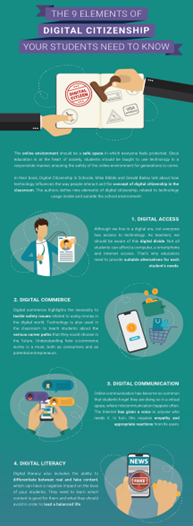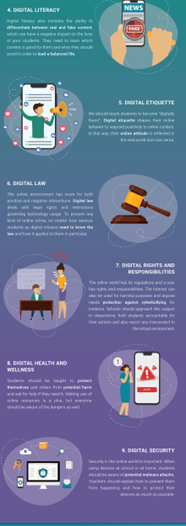Empowering Digital Citizens: The Importance of Digital Citizenship Education
With the rise of technology use, digital citizenship education (DCE) has become important because it teaches citizens, especially young people, to use technology in order to engage respectfully online, to find reliable online sources, and to avoid the violation of human rights. Digital Citizenship Education teaches young adults how to engage and participate in responsible ways of using technology, in order to protect themselves from internet dangers and respect each other’s human rights.
Council of Europe defines “Digital citizenship education” as the empowerment of learners of all ages through education or the acquisition of competences for learning and active participation in digital society to exercise and defend their democratic rights and responsibilities online, and to promote and protect human rights, democracy and the rule of law in cyberspace.
The business sector plays an important role in DCE, and the companies should take the main responsibility and commit voluntarily to raising awareness and user education. There are free and open curricula developed by different companies for teaching Digital Citizenship skills in schools, e.g.,
o Be Internet Awesome: Developed by Google in collaboration with The Net Safety Collaborative, and the Internet Keep Safe Coalition.
o Digital Citizenship Curriculum: Developed by Common Sense Media
o Open Curriculum for Teaching Digital Citizenship & Internet Maturity: Developed by iMature EdTech.
Education and regulatory authorities, both on a national and international level, can target policymakers, often with a view to shaping school curricula or otherwise informing and influencing policy development. Their role in society and their expertise, allow them to play a crucial role both in energising and improving privacy education in schools and making a useful contribution to the legal frameworks dealing with the widespread use of online services collecting students’ data, and general data protection policies.

In their book, Digital Citizenship in Schools , Mike Ribble and Gerald Bailey talk about how technology influences the way people interact and the concept of digital citizenship in the classroom. The authors define nine elements of digital citizenship, related to technology usage inside and outside the school environment, shown in the infographic.
This is one of the approaches to understanding digital citizenship in the US in the K–12 education setting, but the principles and elements are quite applicable elsewhere.

The Council of Europe’s Digital Citizenship Education (DCE) Expert Group identified ten competence domains that served as criteria to analyse and categorise the practises gathered by the multi-stakeholder consultation report. The expert group identified some competence areas that recurred in order to reach a set of competencies that would be the intersection between all of them. The result of this intersection led to the identification of these 10 digital domains in order to match all the dimensions considered in the other frameworks. The ten domains are conceptually grouped into three groups with the intention of better defining the competences that Digital Citizens should develop, and that are described in the Digital Citizenship Education Handbook:
• The first group, Being online, includes domains that relate to those competences needed in order to access the digital society and to freely express oneself.
• The second group, Wellbeing Online, includes domains that can help the user engage positively in the digital society.
• The third group, It is my right!, refers to competences related to the rights and responsibilities of citizens in complex, diverse societies in a digital context.
Council of Europe’s Digital Citizenship Education Handbook states that digital citizenship development initiatives are defined and shaped by the nine guiding principles, which can also serve as reference points or benchmarks for the assessment of progress. They can be described as three types: contextual, informational and organizational:
1. Access to digital technology
2. Basic functional and digital literacy skill
3. A secure technical infrastructure
4. Knowledge of rights and responsibilities
5. Reliable information sources
6. Participation skills
7. Flexible thinking and problem solving
8. Communication
9. Citizenship opportunity

Council of Europe produced several documents and publications that deal with various aspects of digital literacy and digital citizenship, such as Artificial intelligence and education – A critical view through the lens of human rights, democracy and the rule of law (2022) . European Commission developed Ethical guidelines for Educator on the use of AI and data in teaching and learning (2022) and The European Strategy for a Better Internet for Kids and there are several other guides and publications on the European level that can be very useful tools for digital citizenship education.
Civil society has always had a very important role in the education of young people through their non-formal educational programs and education for human rights and democratic citizenship, thus their role in the digital citizenship education is crucial. There are many programmes around Europe and in the US and Canada that are run by civil society organisations, e.g., The US Institute of Diplomacy and Human Rights. Many civil society organisations in Europe that work on the issue of digital citizenship are grouped around the Council of Europe DCE expert group, providing their input and using The Digital Citizenship Education Handbook published by the Council of Europe.
